Search engine optimization (SEO) has the potential to drive valuable traffic and potential customers to your small business’s website. But it’s hard to compete against larger brands with more resources.
The best SEO tools for small businesses can help you identify opportunities, roll out campaigns, and measure your performance.
You can choose from a range of paid and free SEO tools.
Here’s a list of some of the best SEO software for small businesses so you can get an edge on your competitors.
Google Analytics (GA)
Google Analytics is Google’s tool for monitoring and analyzing website traffic.
It’s a one-stop-shop for learning who visits your website, how they got there, and what they do on your site.
73% of the 10,000 most popular websites in the world use GA. It’s the undisputed website analytics market leader.
What makes it so popular?
First, it’s free. But it’s also easy to set up and customize.
All you need to start is a Google account. Sign in to GA, then it will guide you through the setup process. If you get stuck, use our simple guide to GA setup.
Once that’s done, data will populate your GA account in real time.
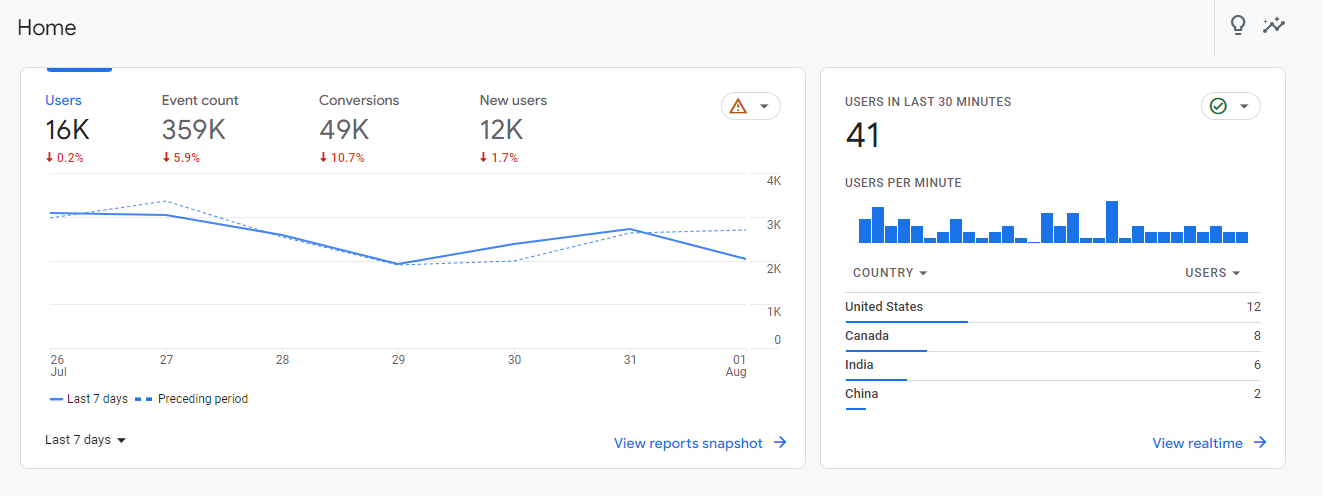
GA4 is the latest iteration of Google Analytics. It succeeds Universal Analytics (UA), which Google phased out in 2023.
It’s highly configurable. You can create detailed custom reports. But even straight out of the box it’s a powerful small business SEO tool.
You can use it to monitor data on:
- Acquisition: What channels does your traffic come from?
- Engagement: How do users interact with your website pages?
- Demographics: Who are your users and where do they come from?
- Conversions: How many website users complete a conversion action?
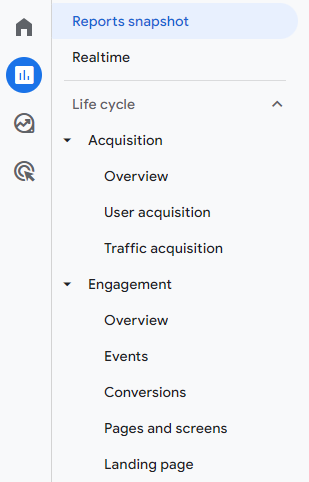
GA4’s data is one of the best ways to measure how many users your marketing strategy brings to your website, and how well your website converts those users into customers.
But GA4 isn’t the most user-friendly platform. It has a steep learning curve. To get the most from it, go through Google’s free GA4 training course before you use it.
Google Search Console (GSC)
Google Search Console is an analytics platform that focuses on how your website performs in organic search results.
It shows which queries your website appears on search engine results pages (SERPs) for, which of your pages appear, how many clicks your ranking pages generate, and more.
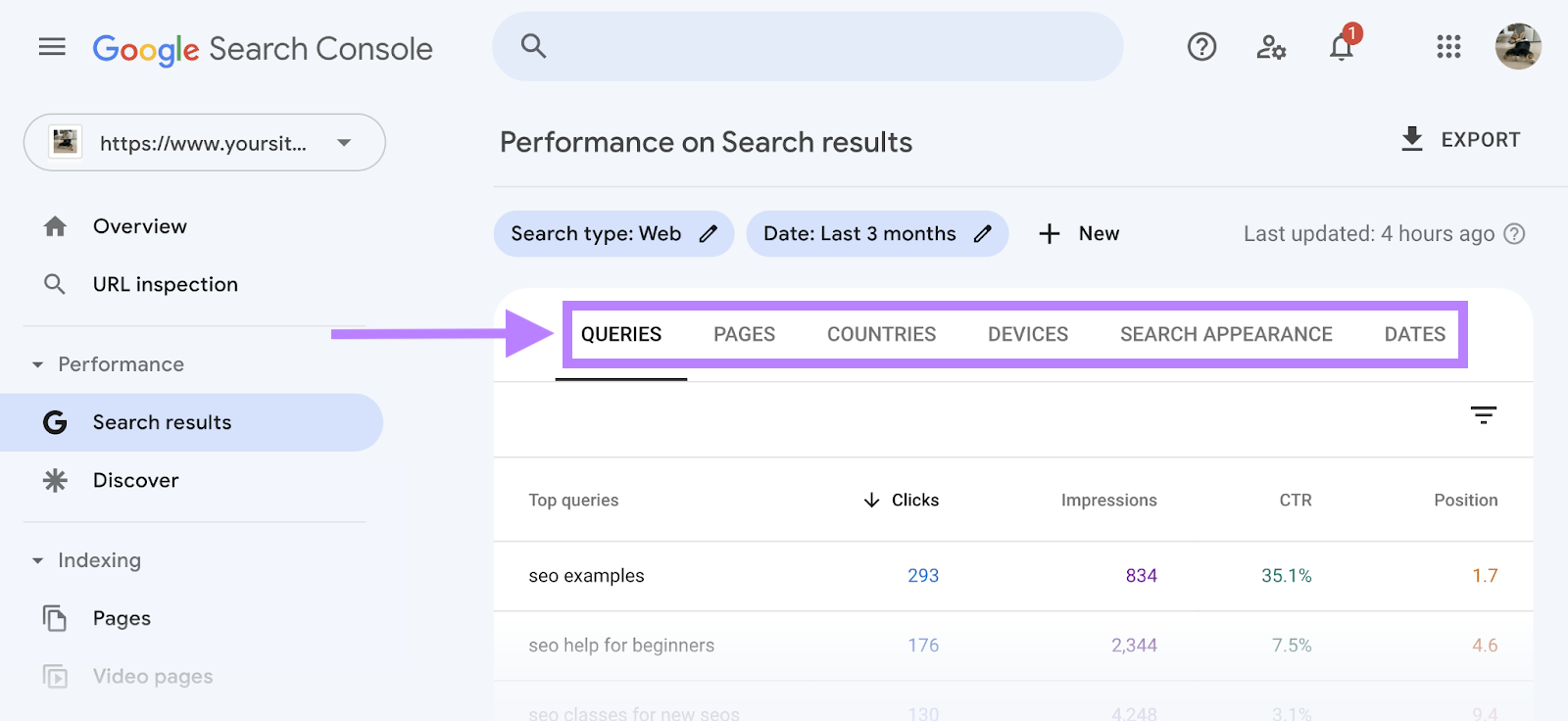
It’s the natural companion tool to GA. GSC tells you how users find you through Google Search. GA explains how they use your site, what pages get the highest conversions, and so much more.
The setup process is just as simple as GA’s. As long as you have a Google account, you can set up a GSC property quickly and verify your website ownership in one of six ways.
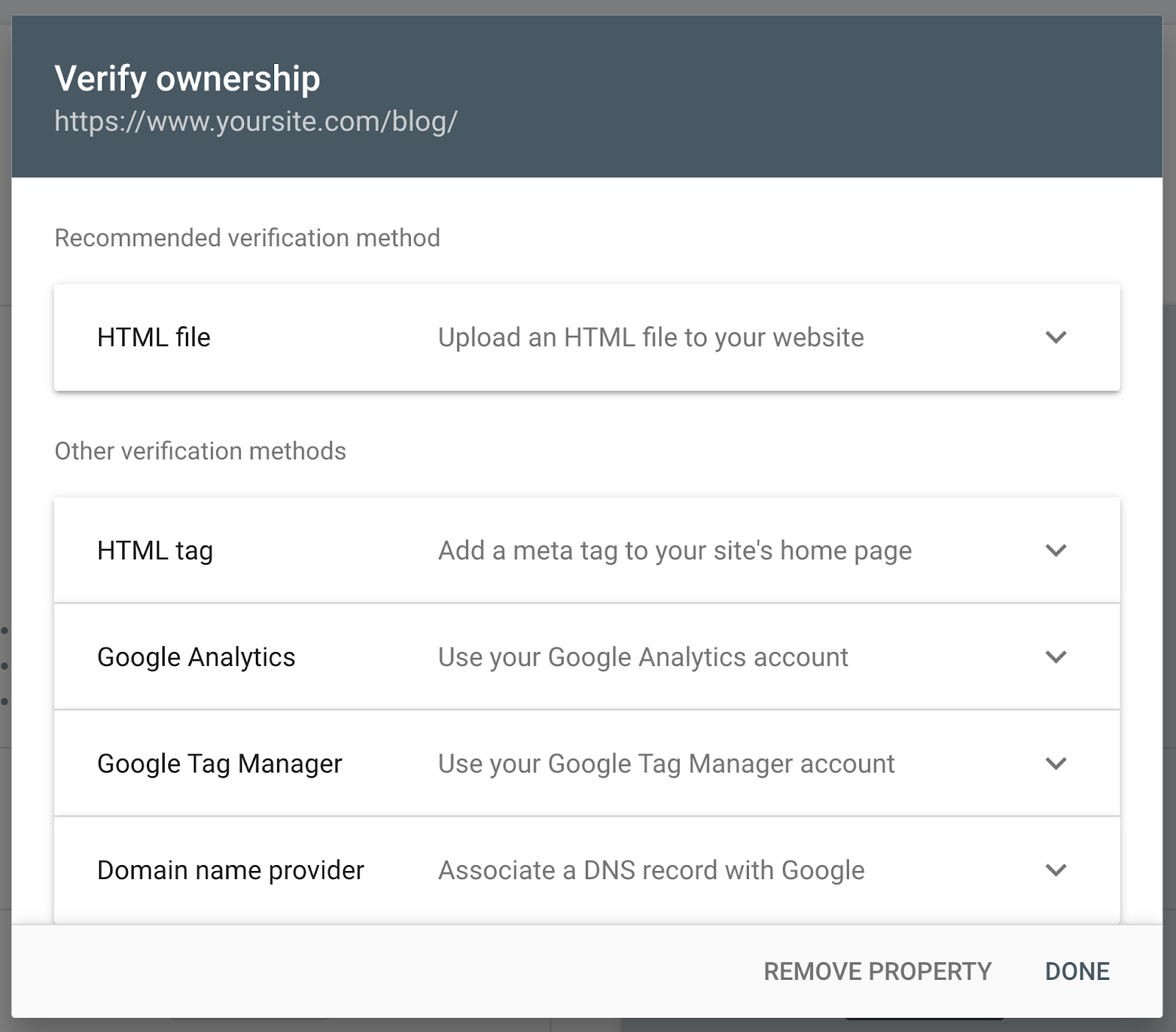
After you’ve verified your property, you’ll see data appear in the performance dashboard.
You can then use query, page, device, and country filters to get insights into how well your website performs on Google.

GSC also offers a variety of technical SEO insights, such as page indexing issues.
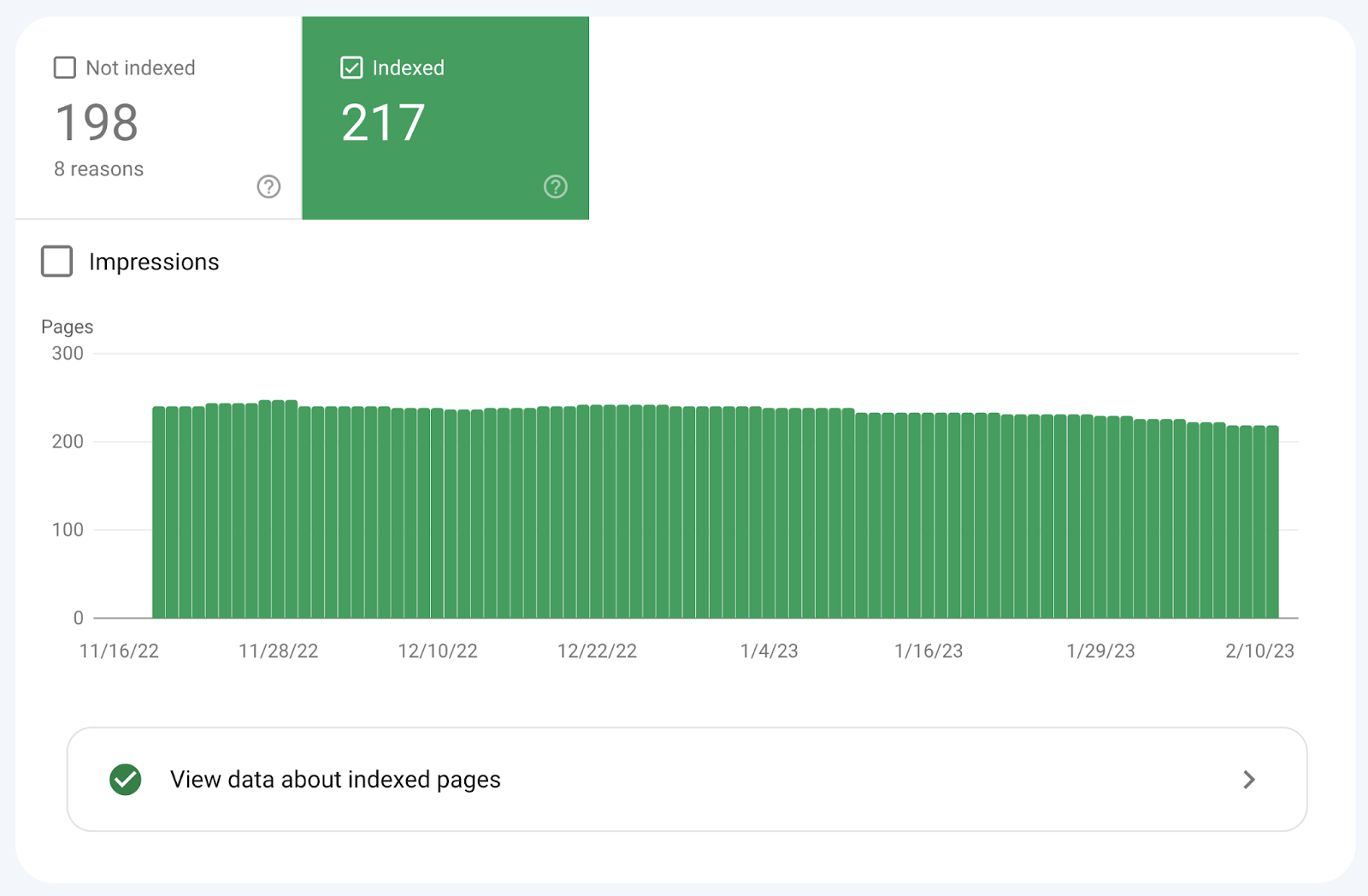
GSC is essential SEO software for small businesses.
The insights it provides into individual keyword and page performance can be instrumental to guide your future SEO strategy.
But it has limitations—like a one or two-day delay on data collection—and restrictions on how many rows of data it shows at one time.
GSC also can’t help with competitor research, as you can only analyze your own website.
Semrush’s Keyword Magic Tool is a keyword research solution that gives you access to a database of 24 billion keywords. You can use it to find the right keywords to target on your website to help you rank in Google search results.
Enter a seed keyword into the search bar, and the Keyword Magic Tool returns a list of related keyword ideas.
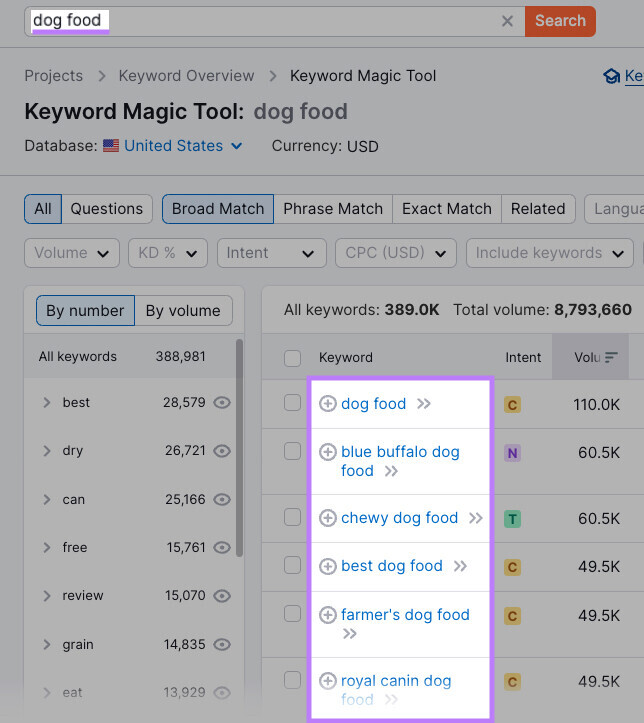
It shows how many monthly searches each one gets, how many search results it returns, and how difficult it is to rank for.
There are lots of ways to filter the keyword lists. You could set parameters for:
- Search volume: How many people search for the keyword every month, on average.
- Keyword difficulty: How difficult it is to rank for the keyword, based on the strength of the competition.
- Search intent: What people who search for the keyword want (e.g., information or a product they can buy).
You can also use the sidebar to trim the list down with modifiers. This is useful when you need related keywords to inspire website content.
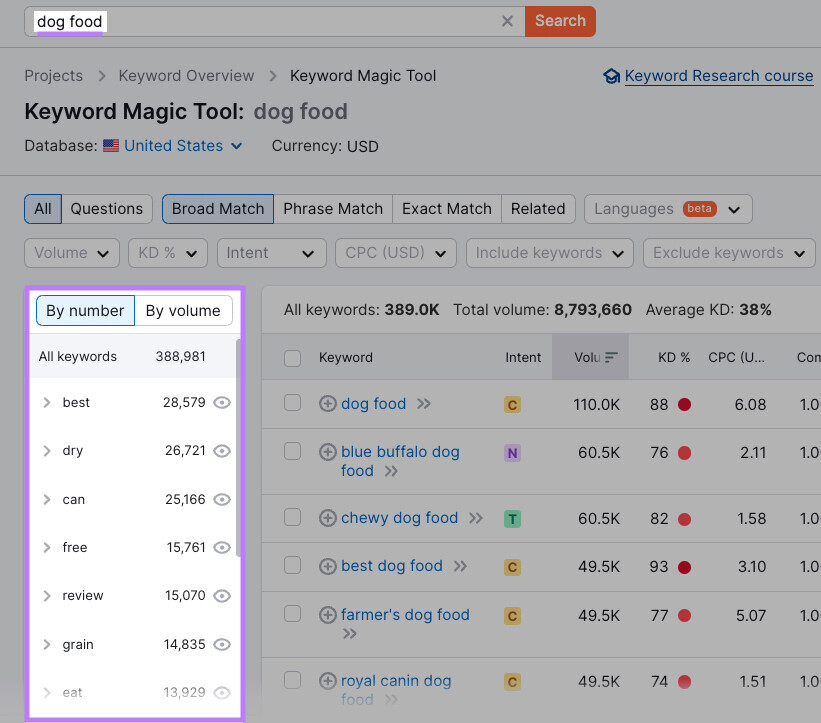
Keyword Magic Tool allows you to create keyword lists and save them to your Semrush account for later, or export them in .XLS or .CSV format to use elsewhere.
Every successful small business SEO campaign starts with keyword research. Keyword Magic Tool is a great option for this because of the size of the Semrush keyword database and its diverse filtering options.
How many reports you can get per day depends on your plan. Free users get up to 10 per day, whereas business uses can get as many as 10,000. Free users can’t share Keyword Manager Lists, but all paid users can share lists.
You can use the free version of Keyword Magic Tool to research up to 100 keywords.
Semrush Organic Research
Organic Research is a keyword-oriented competitor analysis tool. It allows you to analyze any website’s keyword rankings to get a performance overview and specific, targeted insights.
This is perfect for competitor research.
The main Organic Research dashboard shows the number of keywords a website ranks for and an estimate of its organic traffic.
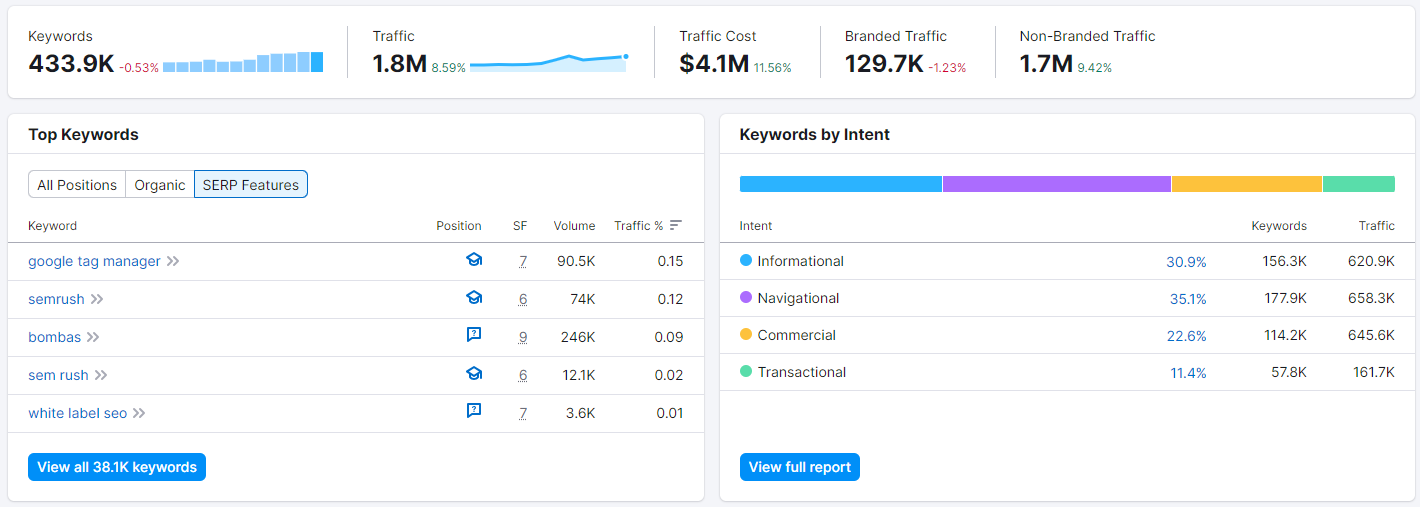
Clicking on any dashboard element gives you more information on the data.
This allows you to see a list of the website’s ranking keywords, its top pages by number of keywords, and how it compares to similar domains.
The keyword rankings list includes filters that let you slice the data with text modifiers, ranking position parameters, search volume, and more.
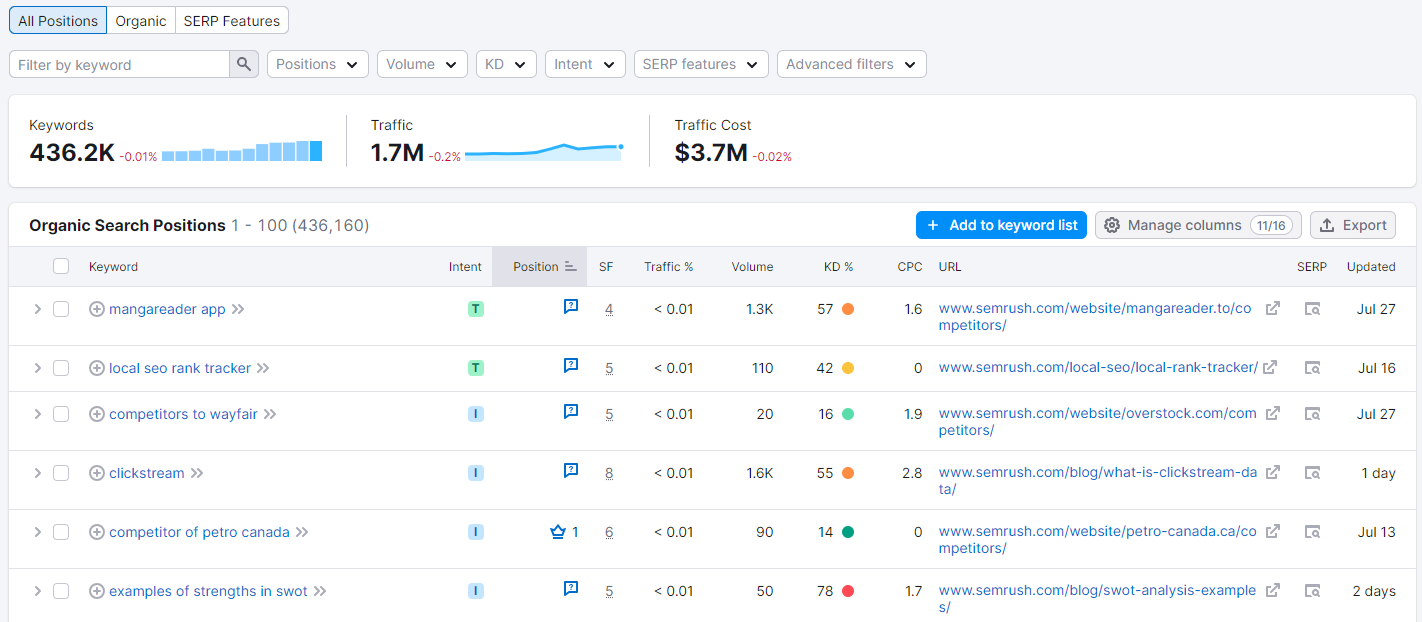
Just like in Keyword Magic Tool, you can export all the data into an .XLS or .CSV.
You can modify the data by country, device type, and ****. And you can view data for specific webpages, subdomains, or subfolders.
Keyword Magic Tool’s range of features make it a perfect supplementary keyword research tool. You can uncover your competitors’ SEO secrets and feed them into your own SEO strategy.
PageSpeed Insights
PageSpeed Insights is a website speed analysis tool that provides guidance on how to make your site load faster.
Why is that so important for small businesses?
Page speed is a confirmed factor in Google’s ranking algorithm. Optimizing it can have a significant impact on your small business website’s organic rankings.
Check out our guide to SEO ranking for more tips to improve your site’s rankings.
Page speed is also important to deliver a better user experience.
Fast loading times—along with other important signals—can contribute to higher rankings.
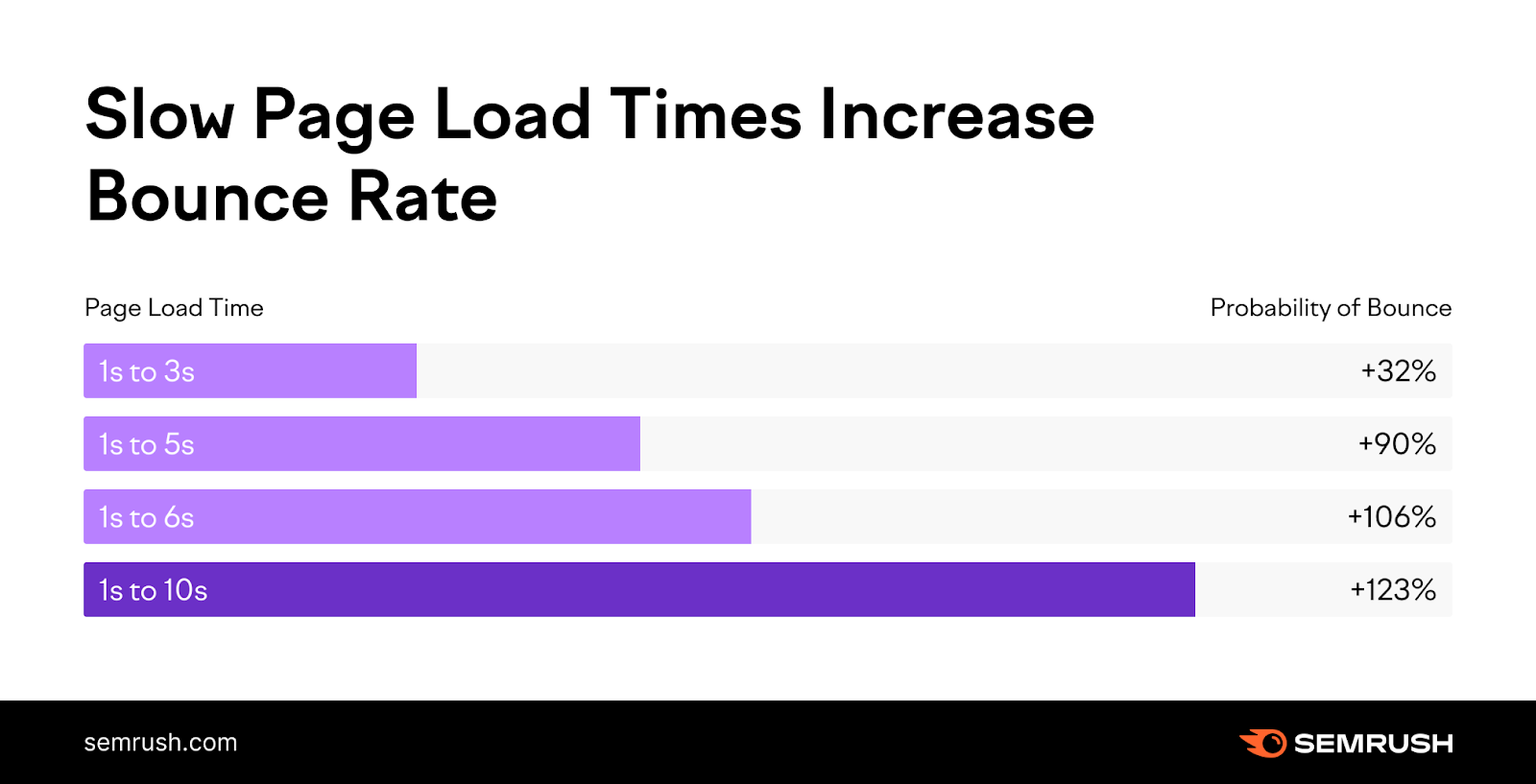
As it’s a Google tool, PageSpeed Insights revolves around its Core Web Vitals metrics. These break the details of page loading speed into three categories:
- Largest Contentful Paint (LCP): The time it takes for the main page content to appear.
- First Input Delay (FID): How long it takes for the page to become responsive to clicks.
- Cumulative Layout Shift (CLS): How often content—such as fonts, videos, and forms—moves when a browser downloads a page.
After entering a URL into the PageSpeed Insights search bar, you’ll see a detailed Core Web Vitals assessment. It will display either a pass or fail result, along with insights into performance for each of the metrics.
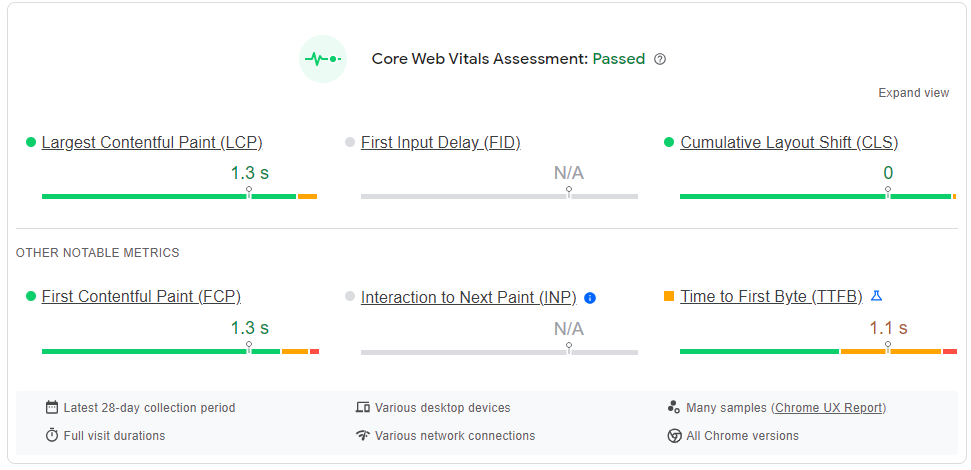
Further down the page, there’s a general page speed performance score and specific recommendations for how to improve page speed. Each one includes estimated load time savings so you can prioritize your actions.

You can also switch between mobile and desktop reports to see how well your website performs on both devices.

It has no bulk analysis feature, so you have to analyze pages individually.
Some of the changes it suggests may also require a website developer to implement.
ChatGPT
ChatGPT is a conversational AI chatbot that can make small business SEO campaigns more efficient.
It uses natural language processing (NLP) and machine learning technology to generate human-like responses to text inputs. Interacting with ChatGPT is a lot like having a conversation—you ask questions, ChatGPT answers.
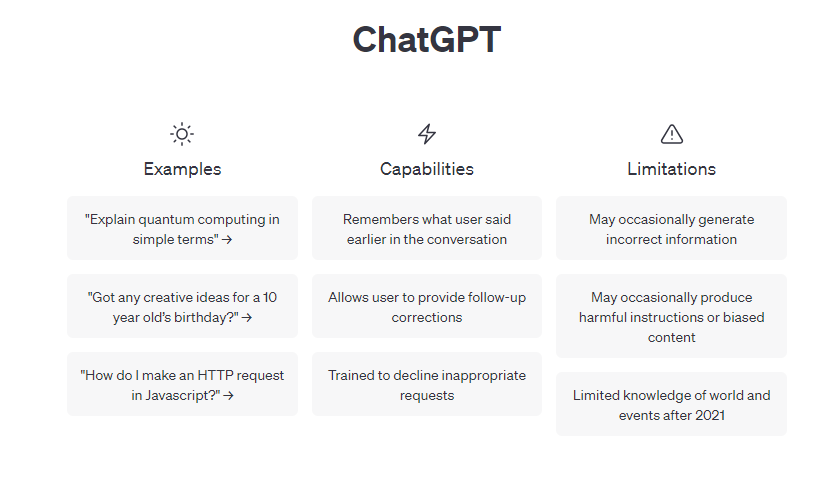
You can apply ChatGPT to almost any marketing function. These are some of the most popular ways to use it:
- Research: A massive dataset trained the AI model behind ChatGPT. Because of this, it can answer diverse questions to help you with research.
- Ideation: ChatGPT can be a helpful assistant as you create a marketing strategy, coming up with creative marketing ideas.
- Writing: ChatGPT writes human-like text, so you can use it to write blog post drafts, social media posts, webpages, and more.
- Editing: You can use ChatGPT to proofread and edit content for your SEO campaign. For instance, it can alter the tone of voice to suit your brand.
- Translation: ChatGPT can translate text into most major languages to assist with international SEO rollouts.
The basic version of ChatGPT is free to use. The paid version unlocks more features, like the ability to access recent internet data.
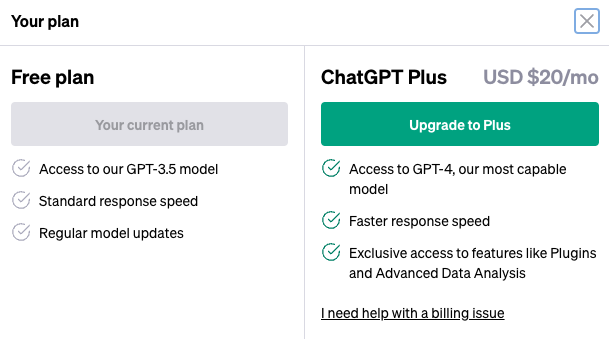
ChatGPT does more than just SEO, but it integrates well into your existing SEO workflows.
Despite the rumors that the data cut-off point on the free version is the end of 2021, ChatGPT has returned more recent data for some queries. However, this information isn’t always accurate. So always check any statistics, dates, or other information it provides before you publish it.
Semrush Site Audit
Site Audit is a website auditing tool that scans your website and flags problems that can hold back SEO performance, like broken internal links and pages with loading issues.
Site Audit reports cover website issues, like:
- Crawlability: Highlighting any pages Google can’t access
- Core Web Vitals performance: Flagging technical issues that affect site speed
- Title tags & meta descriptions: Identifying pages without meta tags (or pages with meta tags that are too long, too short, or duplicative)
- Internal links: Finding broken links and other internal linking issues
Here’s why this matters:
All these things impact SEO performance, and therefore your ranking potential.
Site Audit puts any issues into one of three categories: errors, warnings, or notices. This helps you prioritize fixes based on their severity to make sure you focus on the right problems.
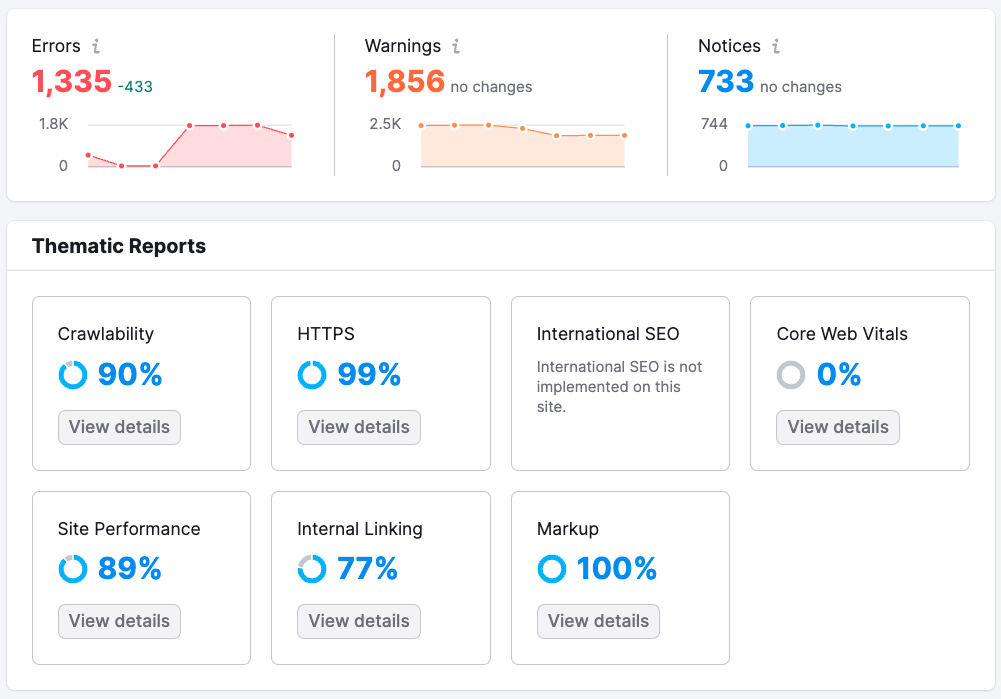
You can schedule SEO audits to run regularly, with a progress report that tracks the number of issues over time.
This is a great way to stay on top of your small business website’s technical health to make sure it doesn’t hold back your SEO efforts.
It provides an overview of what you can do to improve site performance, and catches issues as they arise.
However, your subscription level affects how many pages your Site Audit can crawl.
Each package comes with a total number of pages a user can request to be crawled per month.
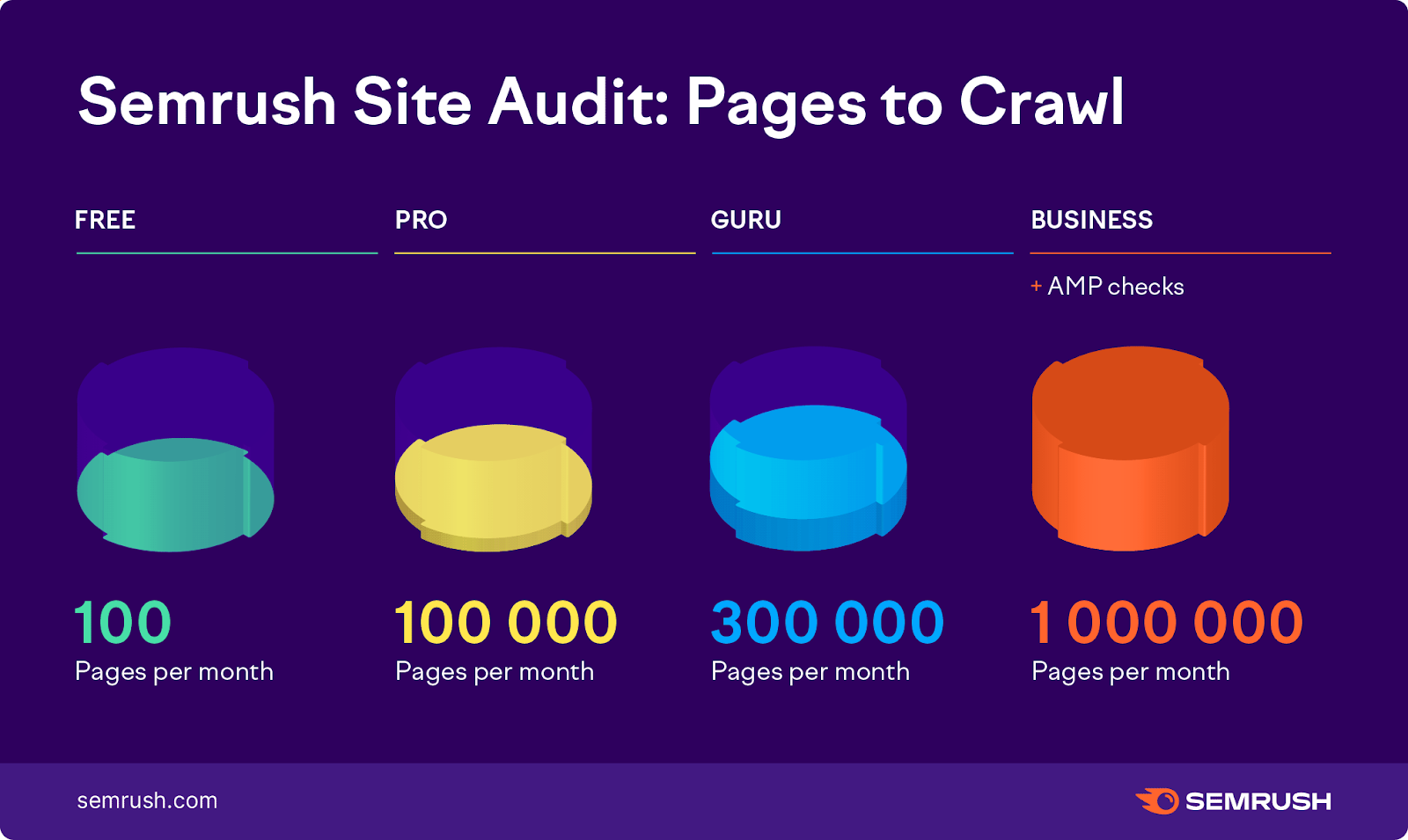
Page crawls don’t roll over each month. If you use up your crawl limit, you’ll have to either wait until next month for the limit to reset, expand your limits, or upgrade your account. So keep this in mind to get the most from your Site Audit.
You can get started with Site Audit for free and generate a custom SEO to-do list for your website.
Semrush On Page SEOChecker
On Page SEO Checker is SEO analysis software that gives you ideas to improve rankings for your target keywords.
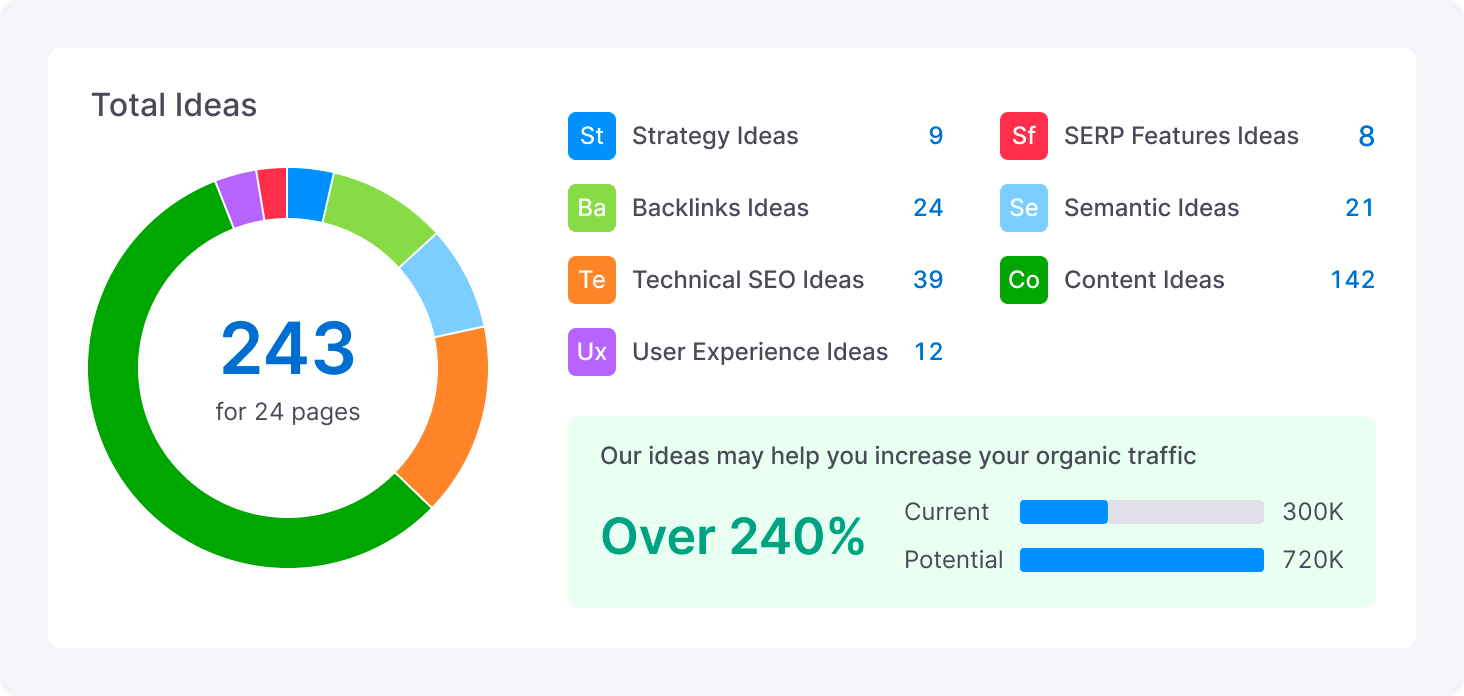
It compares each page on your website with the top 10 organic competitors for your target keywords.
The report shows you a list of recommendations by page, prioritized by their potential to boost your organic traffic.
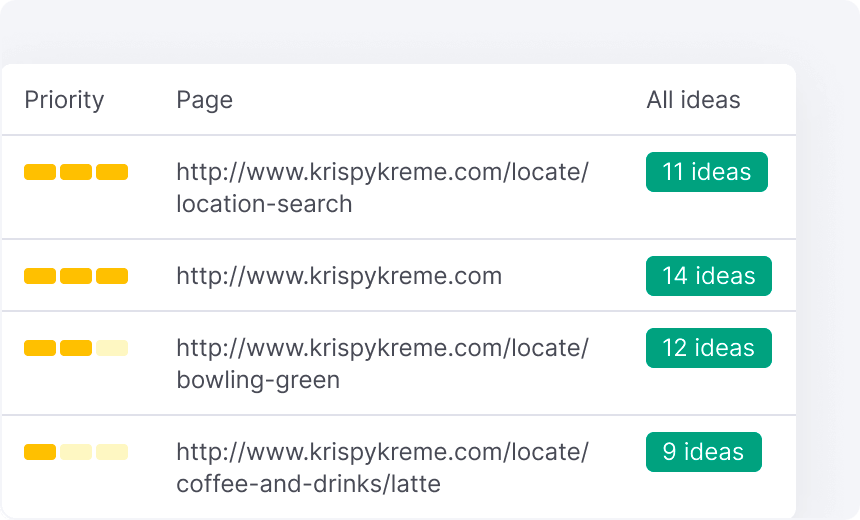
Clicking on a specific page allows you to dive deeper into the report. There, you’ll find on-page recommendations split into categories like technical SEO, related keywords, and ideas to improve user experience.
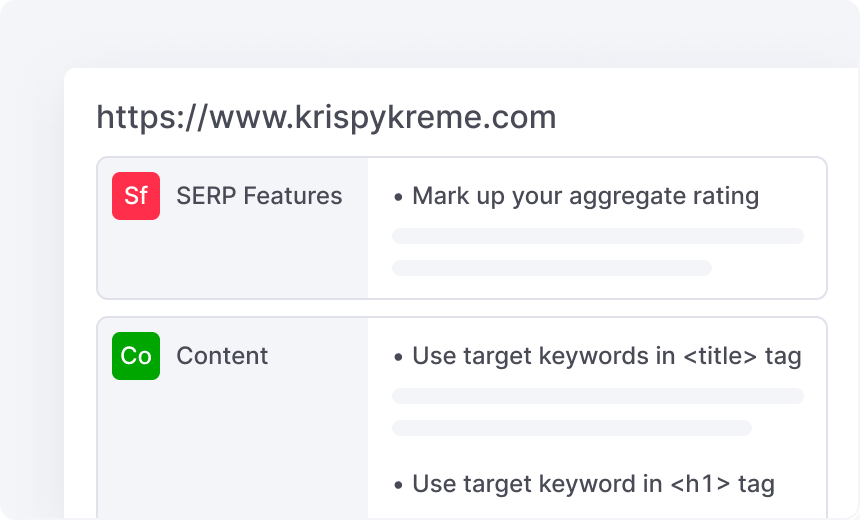
Collectively, SEOs call these categories on-page optimization factors. They play an important role in overall SEO success, helping individual pages rank for their target keywords.
On Page SEO Checker shares SEO Idea Units with SEO Writing Assistant and SEO Content Template.
Every target keyword you enter counts toward this limit. How many you get depends on your plan.
On Page SEO Checker can help you find missed opportunities on all of your important pages. This makes it easy to prioritize and work on improvements.
Semrush SEO Content Template
SEO Content Template is an automated content brief creator. It can speed up your content creation process and improve your content’s ranking potential.
How can this help you get better SEO results?
All SEO campaigns need content. The more new content you create, the more keywords you can target. And the more traffic you can attract.
To use SEO Content Template, you need your target keywords. You can enter up to 30 at a time.
Type them in to the text box, choose your target country and device, then click “Create content template.”

SEO Content Template analyzes the top 10 ranking pages for your keywords and creates a content outline you can use as a basis to write from.
It provides simple but important recommendations, like:
- Semantically-related keywords to include
- A suggested content length, expressed as an ideal word count
- Potential targets for backlinks
It also provides clear guidelines on how to put together the right content structure to meet search intent. The detailed guidance helps you create well-optimized content that’s more likely to rank every time.
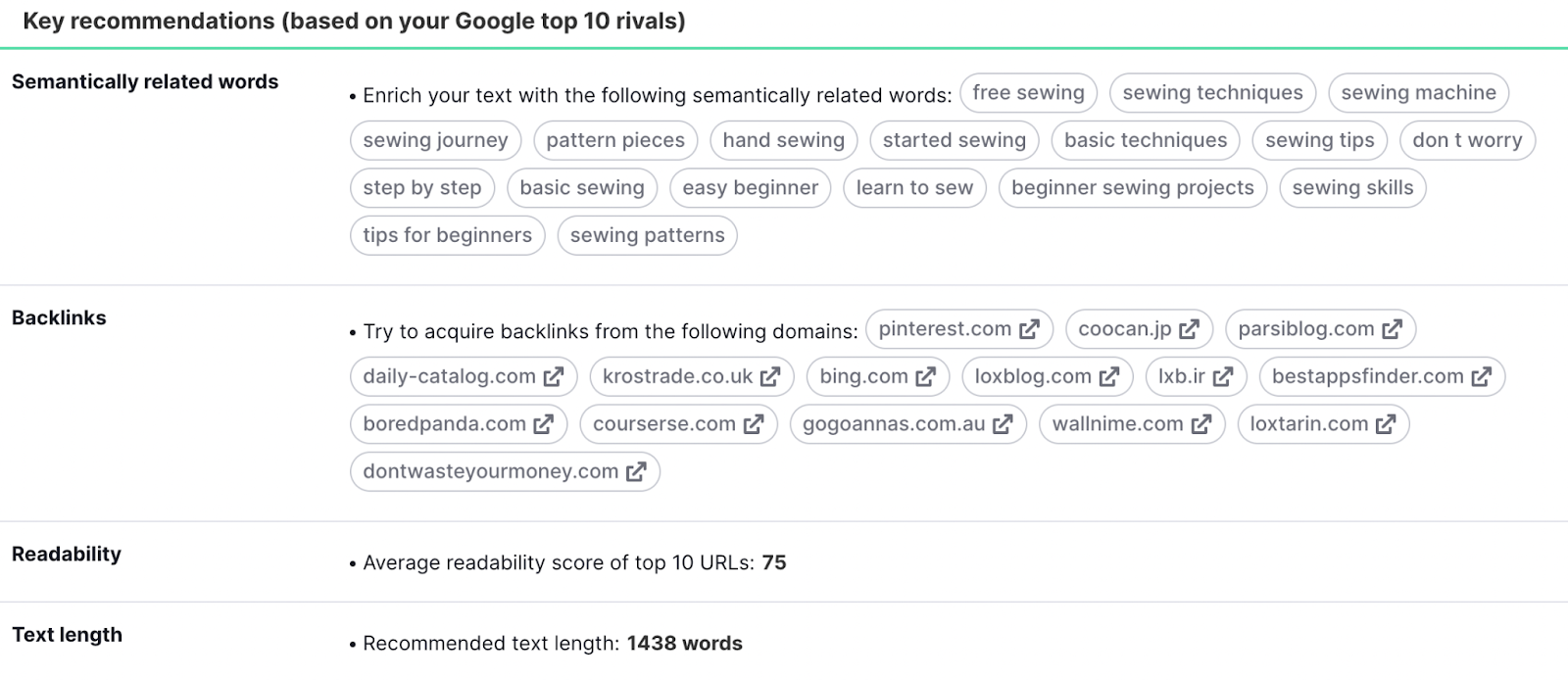
You can also see how your rivals’ content uses the target keywords to inspire ways to include them in your piece.
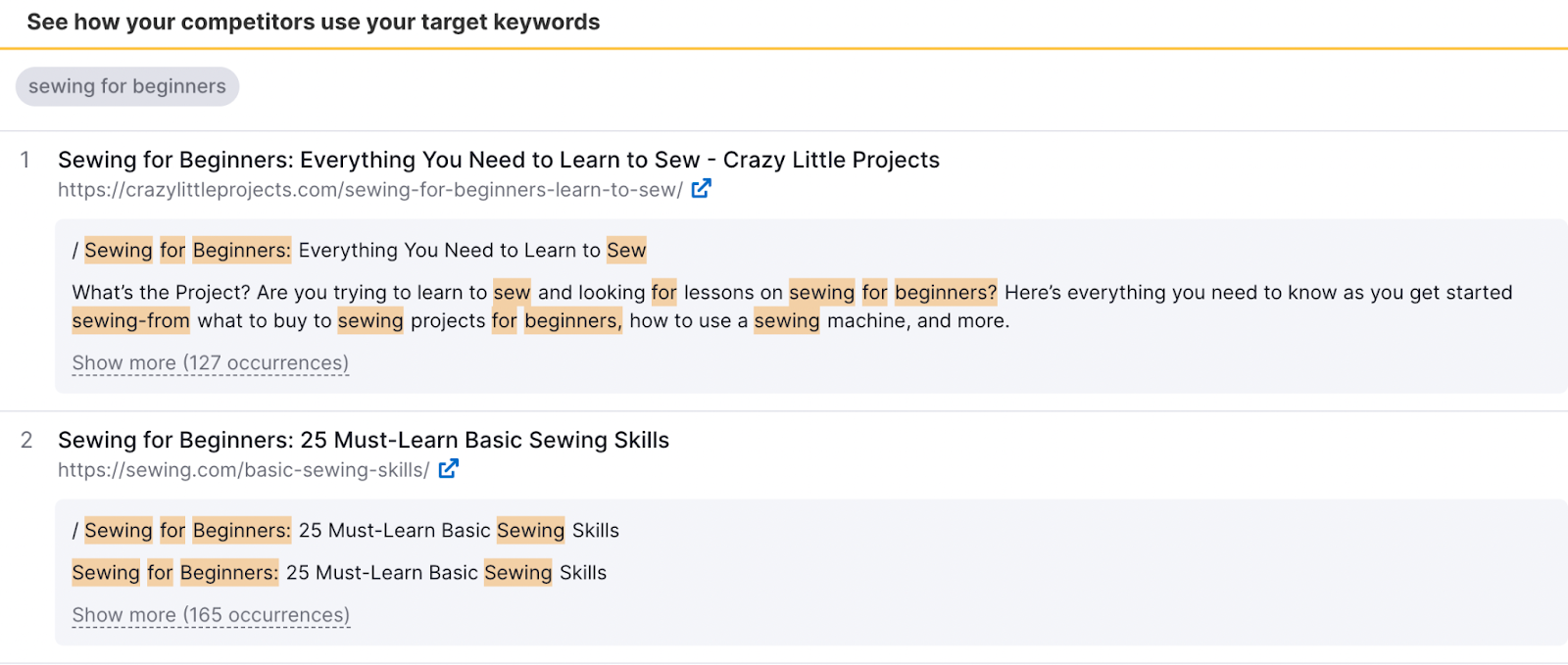
Any small business SEO campaign needs content marketing. It’s a great way to grow your website’s visibility, putting you on search results pages for keywords that feature in your target audience’s buying journey.
It uses the same SEO Ideas Units as On Page SEO Checker and SEO Writing Assistant, so keep that in mind when you create a new template.
SEO Content Template can help content creators—from beginners to experts—overcome challenges in the SEO content production process.
Semrush SEO Writing Assistant
SEO Writing Assistant is a content analyzer that helps you edit and optimize website content to rank for target keywords, match your brand’s tone of voice, and more.
You can use it to improve content from service page copy to blog posts.
Here’s how it works:
Paste a draft into the text editor. SEO Writing Assistant analyzes it against the top 10 organic competitors for your target keywords.
It’ll score your content out of 10. Its four main metrics are readability, SEO, originality, and tone of voice.
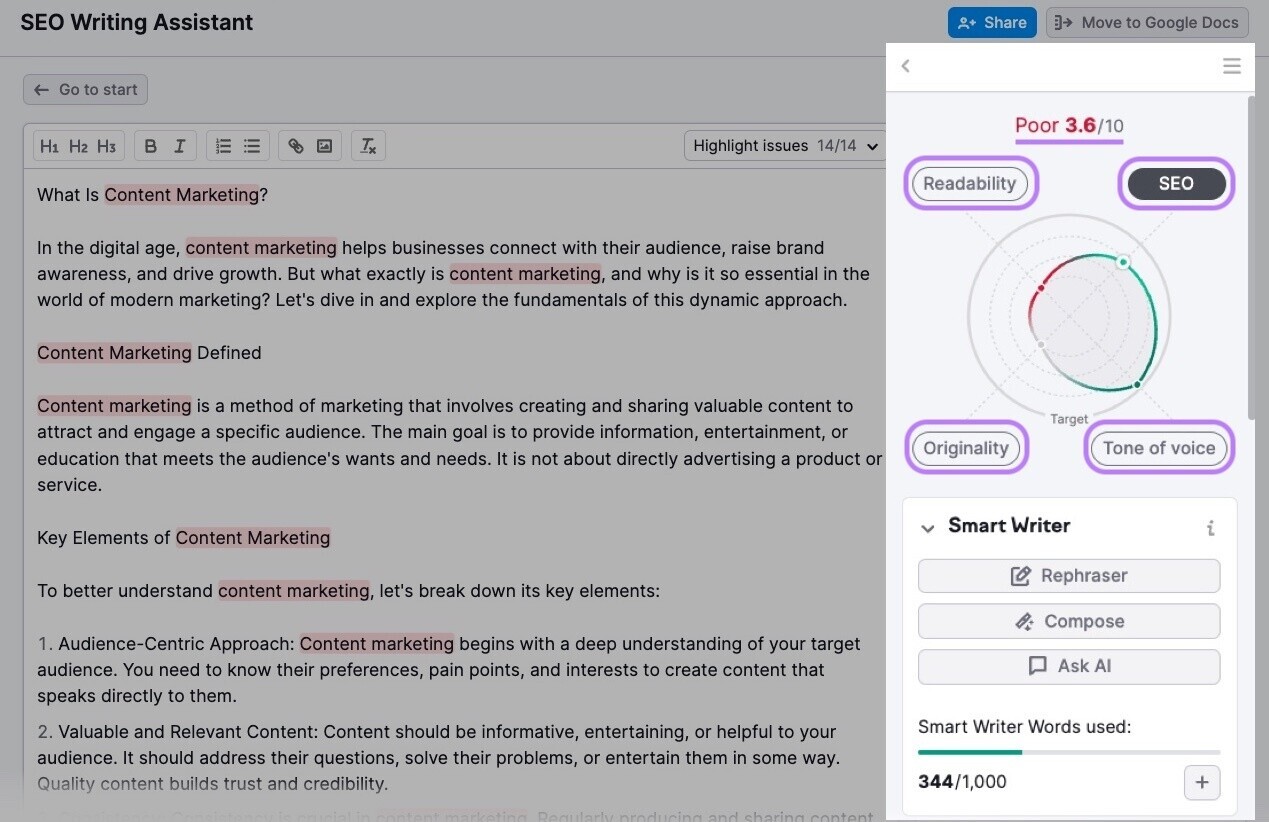
It also generates custom recommendations on:
- Keywords to include
- Sentences to rewrite for readability
- How to make the tone of voice consistent
- Whether to include more internal links
- Content length
You can then make live edits to your content to address these recommendations. It updates the score automatically.
This makes it simple to optimize your content and make it more likely to rank well for your target keywords.
There’s even a user-friendly AI-powered writing tool built in to help you make the edits. It can rephrase sentences, remove repetition, and repurpose the content for other channels, like social media.
It’s a valuable skill for small business SEO to produce well-optimized content.
However, it does use the same SEO Ideas Units as On Page SEO Checker and SEO Writing Assistant. So bear that in mind or consider upgrading your plan to get even more from all three tools.
SEO Writing Assistant makes the process easier, especially when you combine it with SEO Content Template.
Looker Studio
Looker Studio, previously known as Google Data Studio, is a free data visualization platform that builds custom SEO reports. You can track your results and share them with other stakeholders.
It offers data display options like charts, graphs, and tables.
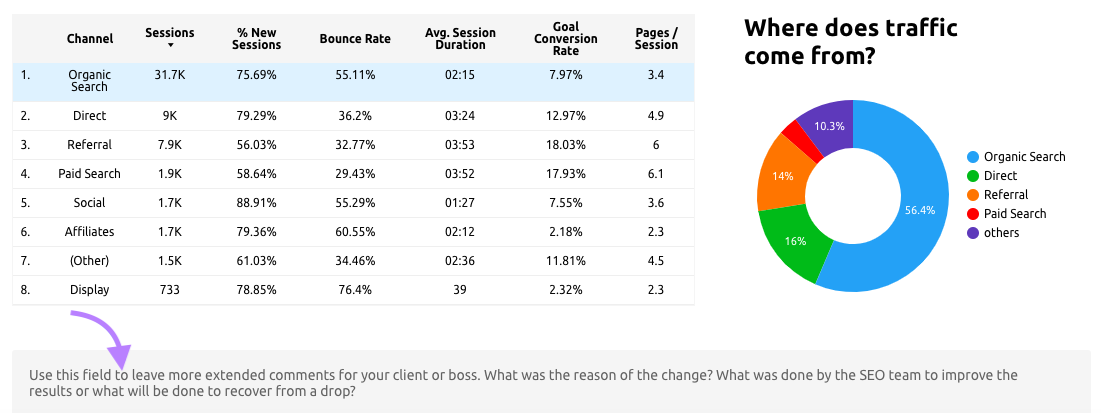
Although it’s easy to understand the reports it generates, it can take some time to learn how to use it and get everything laid out the way you want it.
You can connect different data sources to Looker Studio to monitor everything from website traffic data to sales figures.
Here are some tools that integrate with Looker Studio:
- Google products like GA, GSC, and Google Ads
- Social media platforms like Facebook and Twitter
- SEO software like Semrush
- Databases like BigQuery and MySQL
When you connect the right data sources, you can create comprehensive performance dashboards which cover all your business key performance indicators (KPIs).
Because the integrations pull data in real time, your reports update automatically.
This makes Looker Studio perfect to monitor your website and marketing performance. After you set up your dashboard, you can bookmark it to revisit whenever you need an update.
Microsoft created Bing Webmaster Tools, an organic search analytics platform. It’s similar to Google Search Console, but it uses data from Bing.
The most important platform to consider in your SEO campaigns is still Google. But Bing’s new AI-powered features mean it’s more popular than ever before.
Bing holds the next largest market share for global search engines (almost 6% in North America). So you get a near-complete overview of your organic search performance if you use GSC alongside BingWebmaster Tools.
BingWebmaster Tools features lots of the same capabilities as GSC. That includes insights into your website’s performance in Bing Search and its overall technical health.
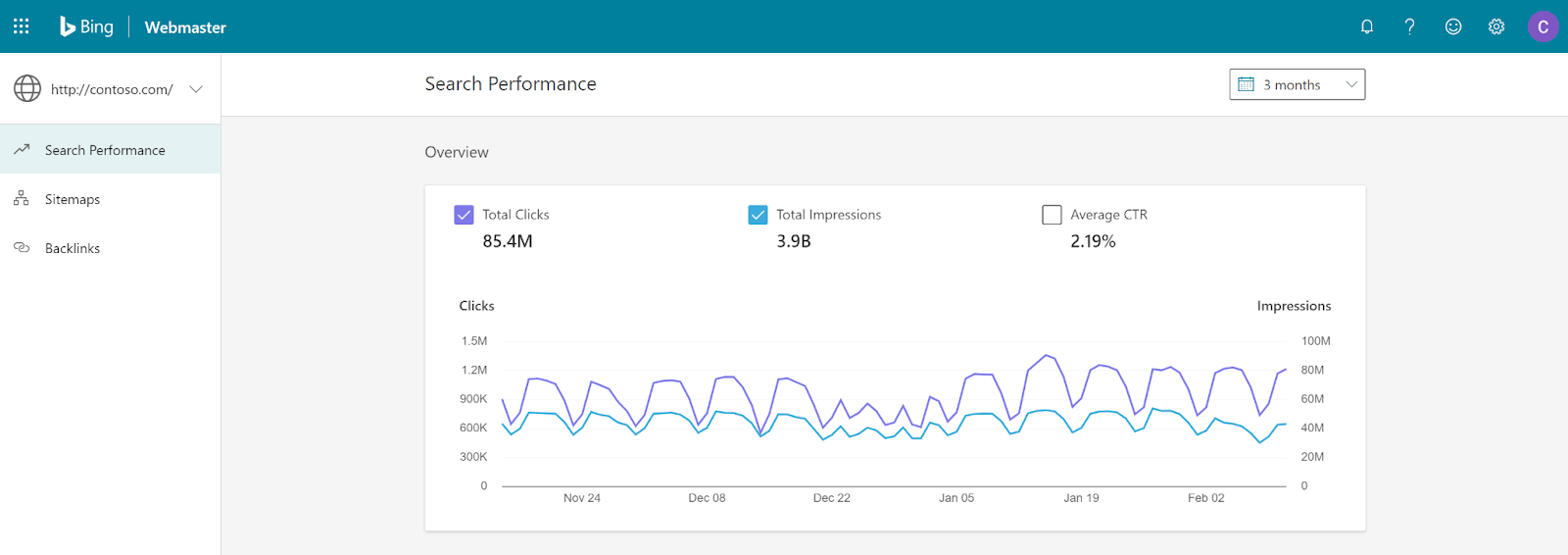
But it also offers additional features, like a built-in keyword research tool.
Even though it’s a much smaller market share, millions of searchers use Bing. That means BingWebmaster Tools’ insights can give you an edge over competitors who only focus on Google.
However, it doesn’t have quite as many features as GSC, possibly because of its smaller market share. It also has limited third-party integrations.
Semrush Position Tracking
Position Tracking is a keyword position monitoring tool that makes it easy to keep track of your website’s keyword rankings.
You can manually add keywords or import them from sources like Keyword Magic Tool.
The Position Tracking dashboard uses this information to visualize your organic search rankings in a variety of ways. That includes by position bracket (top three results, position 4-10, etc.).
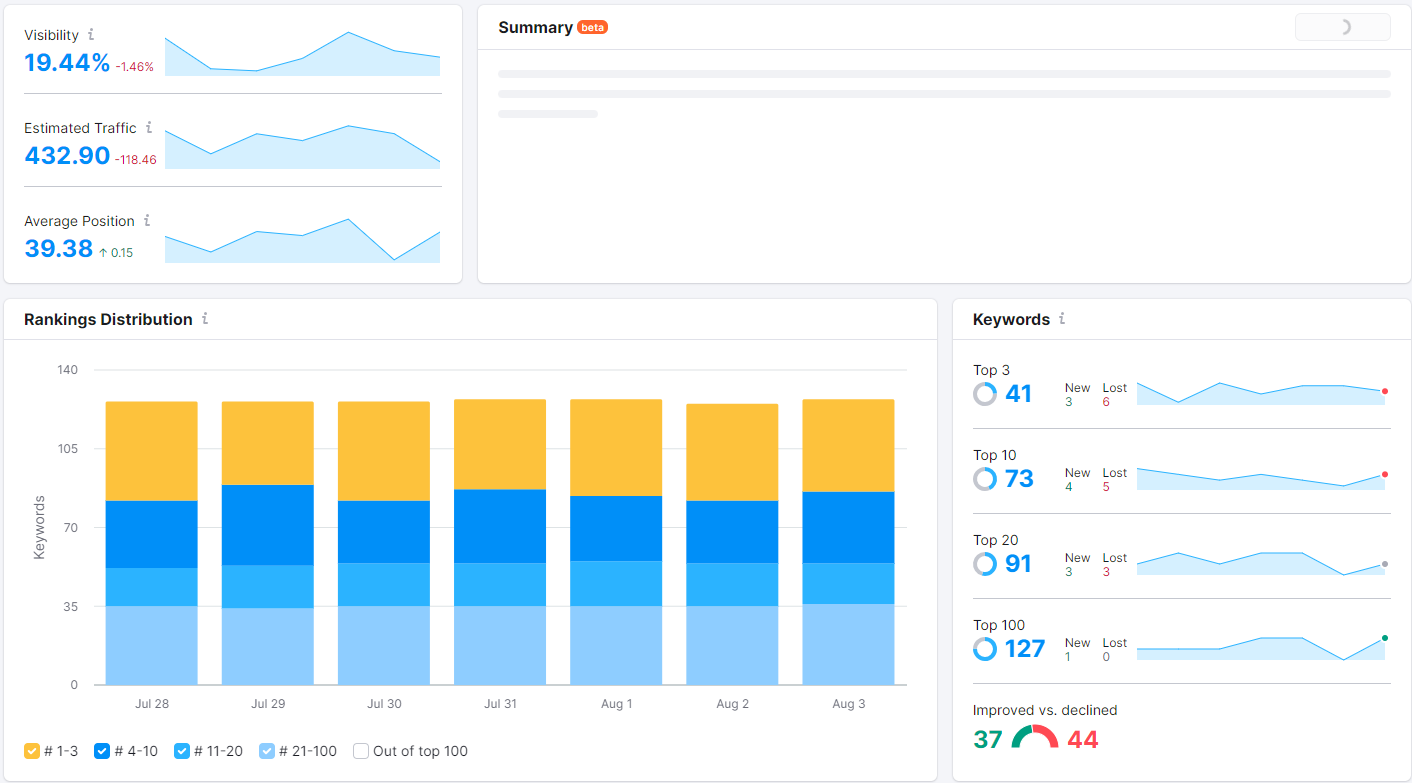
It’s also packed with additional rank tracking features.
You can categorize your keywords for easy analysis with its tagging system.
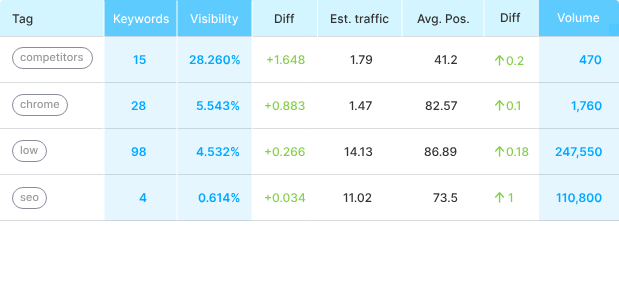
You can add competitors’ domains to compare performance against your biggest rivals.
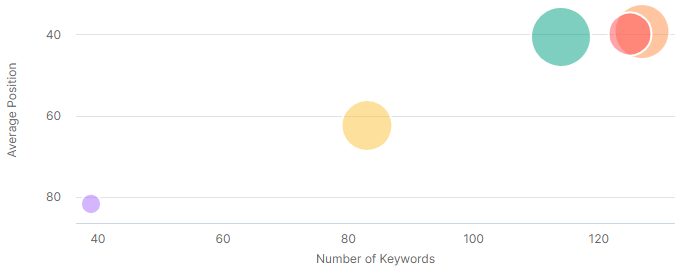
And if your small business website targets different areas through local SEO campaigns, you can track rankings in each location.
Position Tracking has subscription limits depending on the package you choose. Some also have additional features, such as the Cannibalization Report.
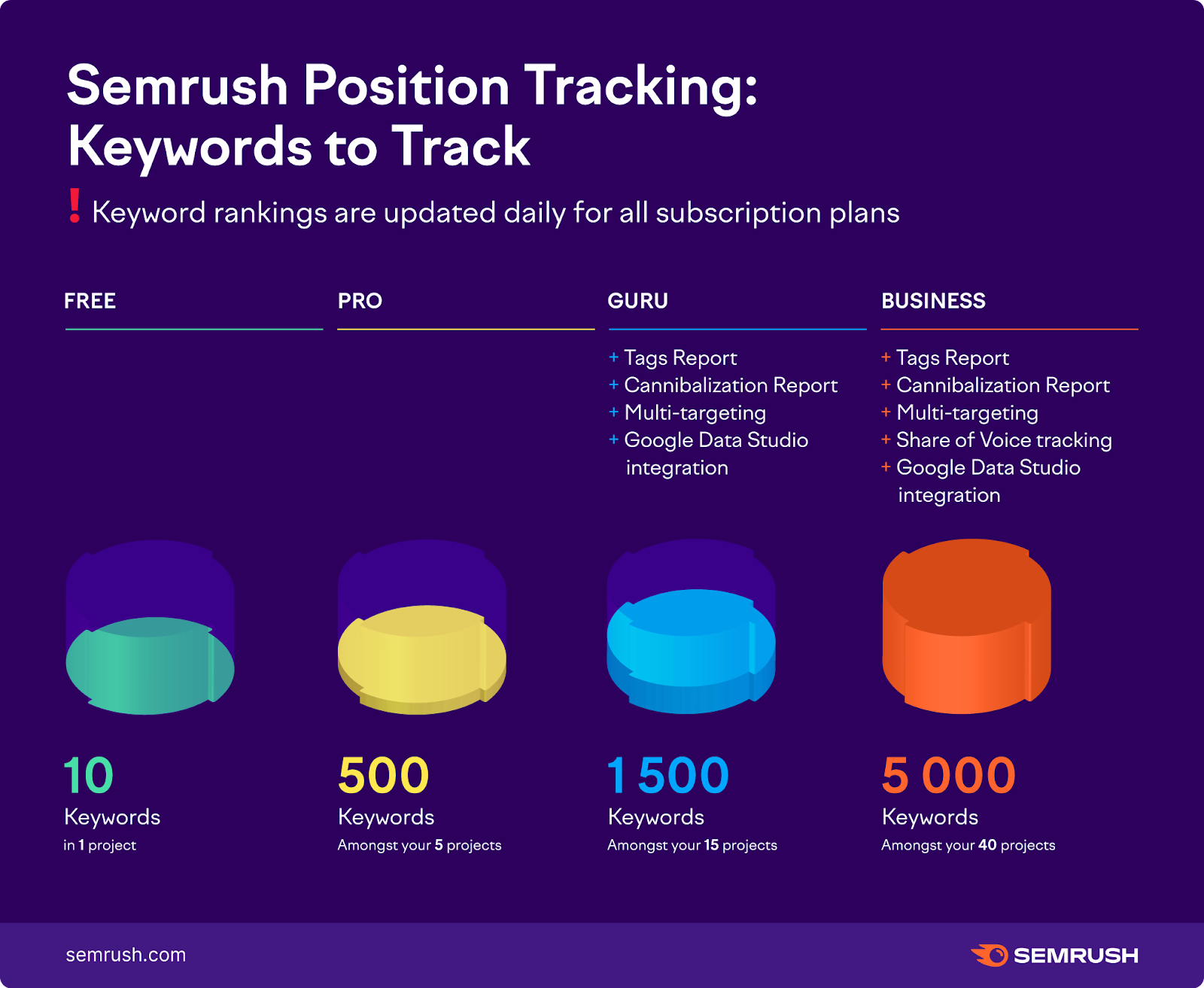
If you run out of keywords, you have the option to remove keywords or projects. You could also buy more keywords or upgrade your account.
Monitoring your target keywords from the start of your SEO campaign can help you determine whether your strategy is effective in real time.
Semrush Backlink Analytics
Backlink Analytics is a complete backlink analysis and tracking tool. You can use it to monitor your site’s backlinks, discover opportunities to create more backlinks, and even check on your competitors’ backlinks.
Backlinks are important for SEO success. As a general rule, the more you have, the better your website will rank. Particularly if they come from popular or trustworthy websites.
This makes backlinks especially important for small businesses. If you compete against larger, more established brands, backlinks can give you a real shot at outranking them.
The main dashboard allows you to sort your links in different ways. For example, you can see the category the referring domain fits in to.
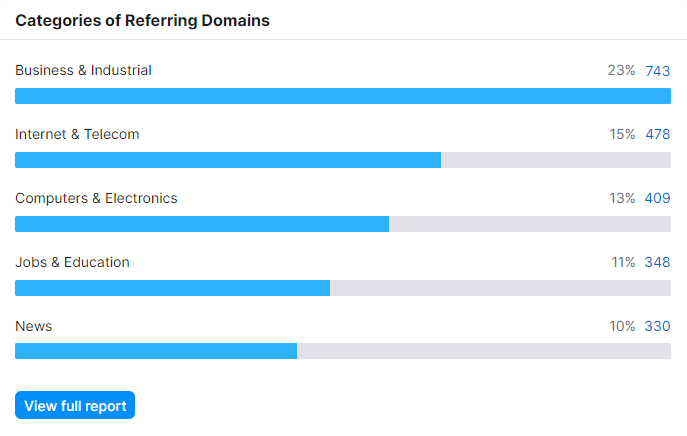
And you can use the Semrush Authority Score to evaluate how your links could affect your SEO performance.
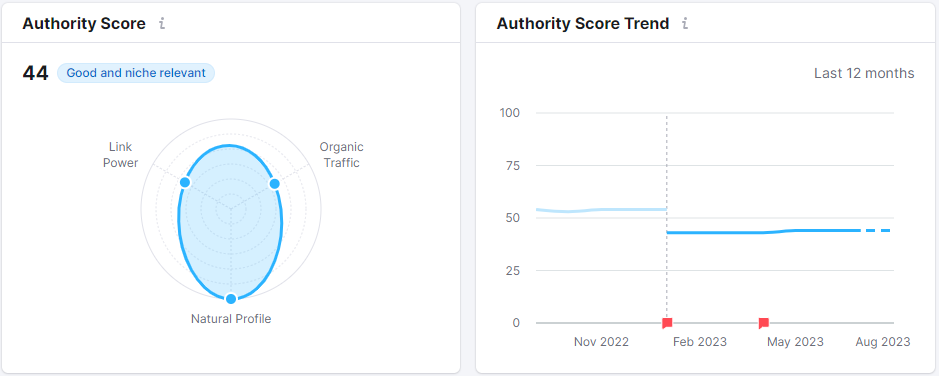
You can also use Backlink Analytics’ functionality to assess your competitors’ backlink profiles.
This could inspire new link building strategies.
Each plan gets a different number of projects. If you need more space, you can delete a project to free up space, but this does mean you’ll lose all of the previously collected data.
Semrush Keyword Gap
Keyword Gap is a domain comparison tool that highlights differences between your keyword rankings and your competitors’. It’s great for finding new keyword opportunities that you can target to get more traffic.
However, it doesn’t include data from Bing, YouTube, or other popular search engines.
Whether this matters for your business depends on your goals and target audience.
You can add up to five domains or individual pages to Keyword Gap to compare their keyword coverage.
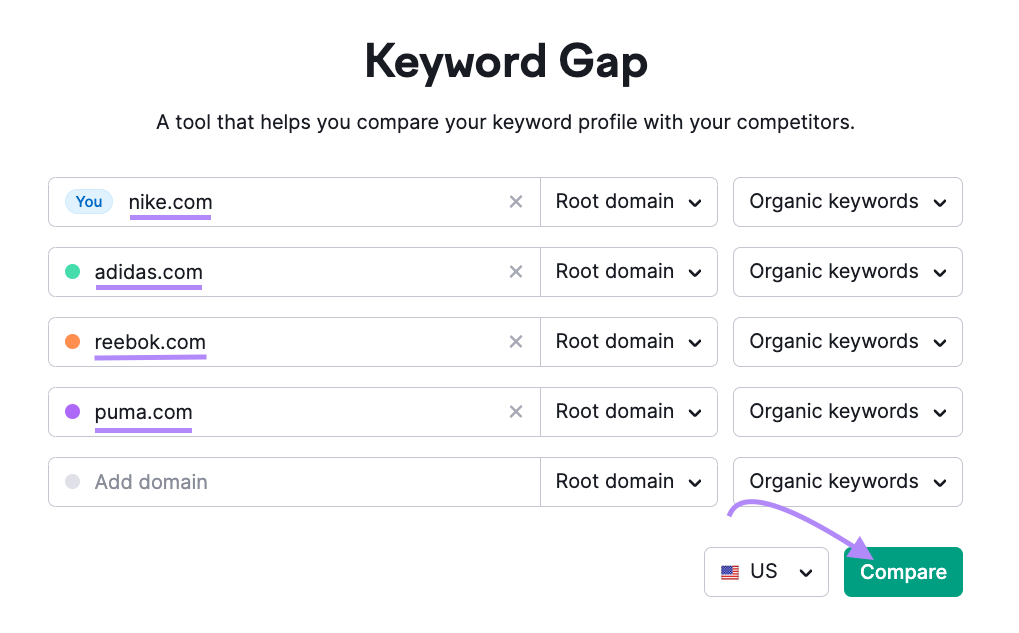
The report shows the keyword overlap between the different websites in several ways, including a helpful chart and an exportable table.
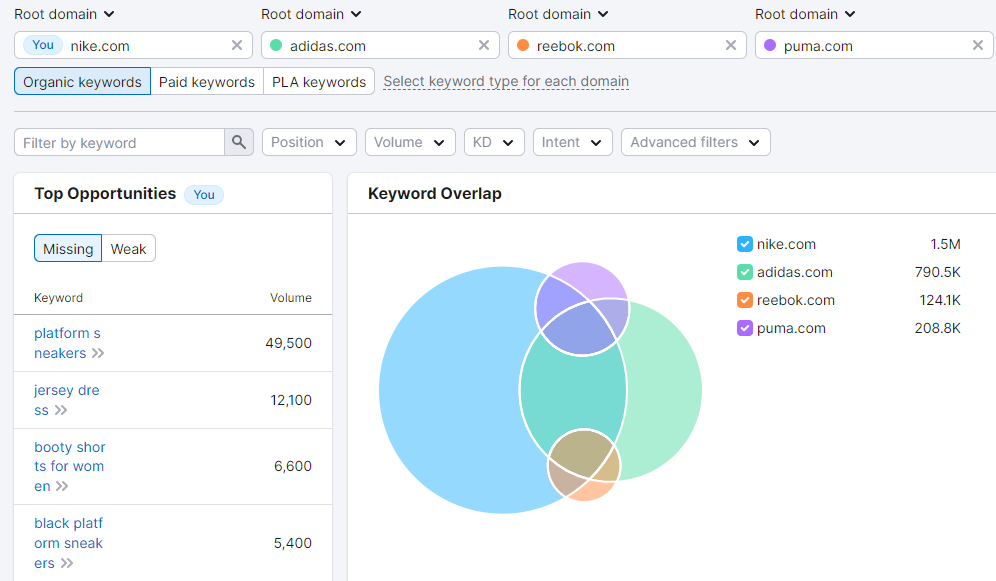
It also shows your top keyword opportunities.
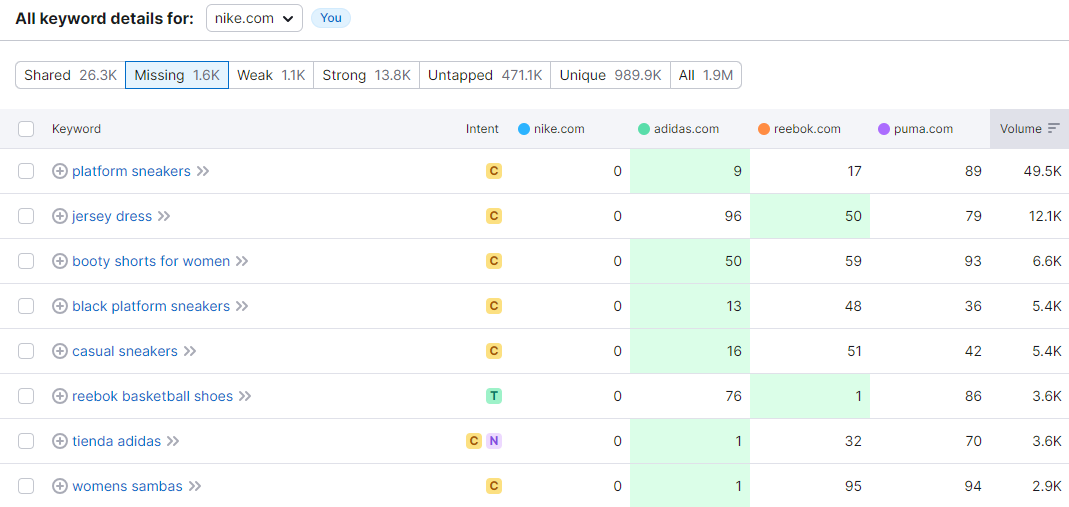
You can use these as inspiration for content to expand how much traffic you get through organic search and attract new users.
Assemble Your Small Business SEO Software Stack
SEO is essential for small businesses, whether as a standalone channel or as part of a broader digital marketing campaign. But you won’t get far without the right tools.
The best SEO tools for small businesses can help you improve your keyword research, content creation, and website analysis. What combination you need depends on your business.
First, try some of the best free SEO tools for small businesses, like Google Search Console and Keyword Magic Tool.
From there, you can build out a bigger toolkit that helps you make the most of your SEO campaign.
Source link : Semrush.com
